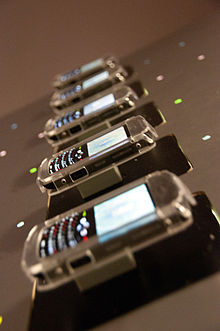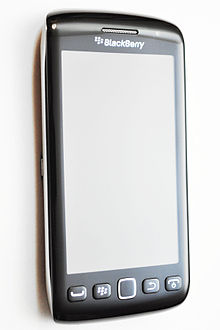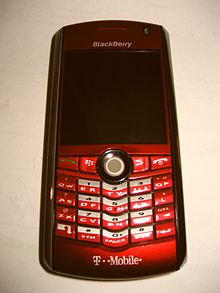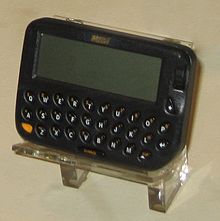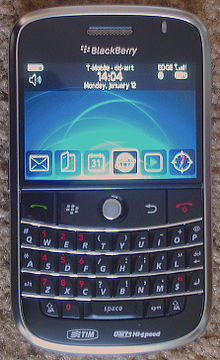- BlackBerry
-
This article is about the wireless e-mail device. For the fruit, see Blackberry. For other uses, see Blackberry (disambiguation).

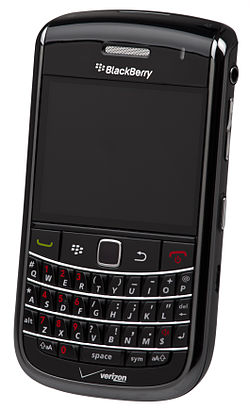
BlackBerry 7 SmartphonesManufacturer Research In Motion (RIM) Compatible networks GSM 850/900/1800/1900
GPRS/EDGE/UMTS
CDMA/1xEV-DO
iDENDimensions 50 × 106.7 × 14.5 mm[1] Weight 87.9 to 155 g depending on model Operating system BlackBerry OS CPU ARM XScale Memory 64 MB – 768 MB reserved application memory, 4 GB media memory on Storm models, expandable to 32 GB via microSD Display 640 × 480 pixels
(Bold 9900/Bold 9930)
800 × 480(Torch 9850/9860)
600 × 480 (Torch 9810)
480 × 360 pixels
(Curve 8900/Tour 9630/Bold 9650/Bold 9700/Bold 9780)
360 × 480 pixels (Storm 9500/Torch 9800 )
480 × 320 pixels (Bold 9000)
360 × 400 pixels (Pearl 3G)
320 × 240 pixels (8300/8500/8700/8800/Curve 3G)
240 × 260 pixels
(7100/8100 series)
240 × 160 pixels (7200/7300 series)Ringtones & notifications Polyphonic, MP3, MIDI Connectivity microSD, USB, Bluetooth, Wi-Fi, GPS, NFC BlackBerry is a line of mobile e-mail and smartphone devices developed and designed by Canadian company Research In Motion (RIM) since 1999.[2][3]
BlackBerry devices are smartphones, designed to function as personal digital assistants, portable media players, internet browsers, gaming devices, and much more. They are primarily known for their ability to send and receive (push) e-mail and instant messages while maintaining a high level of security through on-device message encryption. Blackberry devices support a large variety of instant messaging features, including BlackBerry Messenger.
BlackBerry commands a 11.7% share of worldwide smartphone sales, making it the fourth most popular device manufacturer after Google, Sony Ericsson, and Apple.[4] The consumer BlackBerry Internet Service is available in 91 countries worldwide on over 500 mobile service operators using various mobile technologies.[5] As of October 2011, there were seventy million subscribers worldwide to BlackBerry.[6]
Modern GSM-based BlackBerry handhelds incorporate an ARM 7, 9 or ARM 11 processor,[7] while older BlackBerry 950 and 957 handhelds used Intel 80386 processors. The latest BlackBerry models (Torch 9850/9860, Torch 9810, and Bold 9900/9930) have a 1.2 GHz MSM8255 Snapdragon Processor, 768 MB system memory], and 8 GB of on-board storage.[8][9] All BlackBerrys after OS 5 support up to 32 GB microSD cards.
Contents
History
The first BlackBerry device, the 850, was introduced in 1999 as a two-way pager in Munich, Germany. The name BlackBerry was coined by the marketing company Lexicon Branding.
In 2003, the more commonly known smartphone BlackBerry was released, which supports push e-mail, mobile telephone, text messaging, Internet faxing, Web browsing and other wireless information services. It is an example of a convergent device. The original BlackBerry devices, the RIM 850 and 857, used the DataTac network.
BlackBerry first made headway in the marketplace by concentrating on e-mail. RIM currently offers BlackBerry e-mail service to non-BlackBerry devices, such as the Palm Treo, through its BlackBerry Connect software.
The original BlackBerry device had a monochrome display, but all current models have color displays. All models, except for the Storm series and the all-touch Torch 9850 had a built-in QWERTY keyboard, optimized for "thumbing", the use of only the thumbs to type. The Storm 1 and Storm 2 include a SureType keypad for typing. Originally, system navigation was achieved with the use of a scroll wheel mounted on the right side of phones prior to the 8700. The trackwheel was replaced by the trackball with the introduction of the Pearl series which allowed for 4 way scrolling. The trackball was replaced by the optical trackpad with the introduction of the Curve 8500 series. Models made to use iDEN networks such as Nextel and Mike also incorporate a push-to-talk (PTT) feature, similar to a two-way radio.
Operating system
The operating system used by BlackBerry devices is a proprietary multitasking environment developed by RIM. The operating system is designed for use of input devices such as the track wheel, track ball, and track pad. The OS provides support for Java MIDP 1.0 and WAP 1.2. Previous versions allowed wireless synchronization with Microsoft Exchange Server e-mail and calendar, as well as with Lotus Domino e-mail. OS 5.0 provides a subset of MIDP 2.0, and allows complete wireless activation and synchronization with Exchange e-mail, calendar, tasks, notes and contacts, and adds support for Novell GroupWise and Lotus Notes. The Blackberry Curve 9360, Blackberry Torch 9810, Bold 9900/9930, and Torch 9850/9860 feature the most recent Blackberry OS 7 as of October 2011).
Third-party developers can write software using these APIs, and proprietary BlackBerry APIs as well. Any application that makes use of certain restricted functionality must be digitally signed so that it can be associated to a developer account at RIM. This signing procedure guarantees the authorship of an application but does not guarantee the quality or security of the code. RIM provides tools for developing applications and themes for BlackBerry. Applications and themes can be loaded onto BlackBerry devices through BlackBerry App World, Over The Air (OTA) through the BlackBerry mobile browser, or through BlackBerry Desktop Manager.
Supported software
Further information: BlackBerry App WorldBlackBerry Messenger
BlackBerry devices use the proprietary BlackBerry Messenger, also known as BBM, software for sending and receiving encrypted instant messages, voice notes, images and videos via BlackBerry PIN. Some of the features of BBM include groups, bar-code scanning, lists, shared calendars, BBM Music and integration with apps and games using the BBM social platform.
Third-party software
Third-party software available for use on BlackBerry devices includes full-featured database management systems, which can be used to support customer relationship management clients and other applications that must manage large volumes of potentially complex data.[10]
In March 2011, RIM announced an optional Android player that could play applications developed for the android system would be available for the Blackberry Playbook, RIM's first entry in the tablet market.[11][12][13]
On August 24, 2011 Bloomberg News reported unofficial rumors that BlackBerry devices would be able to run Android applications when RIM brings QNX and the Android App Player to BlackBerry.[14][15][16][17] On October 20, 2011 RIM officially announced that android applications could run, unmodified, on the blackberry tablet and the newest blackberry phones, using the newest version of its operating system.[18][19]
CPU
The latest Blackberry devices such as the Bold 9900/9930, Torch 9810, 9860/9860 feature a Qualcomm Snapdragon MSM8260 CPU clocked at 1.2 GHz. Entry-level models, such as the Curve 9360, feature a Marvell PXA940 clocked at 800 MHz. Previous Blackberry devices, such as the BlackBerry 9000 series, were equipped with XScale 624 MHz processors.[20] The BlackBerry Curve 8520 featured a 512 MHz processor, while the Bold 9700 featured a newer version of the Bold 9000's processor, but is clocked at the same speed. Early BlackBerry devices, such as the BlackBerry 950, used Intel 80386-based processors.[21][22] BlackBerry 8000 series smartphones, such as the 8700 and the Pearl, are based on the 312 MHz ARM XScale ARMv5TE PXA900. An exception to this is the BlackBerry 8707 which is based on the 80 MHz Qualcomm 3250 chipset; this was due to the PXA900 chipset not supporting 3G networks. The 80 MHz processor in the BlackBerry 8707 meant the device was often slower to download and render web pages over 3G than the 8700 was over EDGE networks.
Connectivity
BlackBerry Enterprise Server
BlackBerry smartphones can be integrated into an organization's e-mail system through a software package called BlackBerry Enterprise Server (BES). Versions of BES are available for Microsoft Exchange, Lotus Domino and Novell GroupWise. Google has made a Connector for BES which makes BES available for Google Apps as well. While individual users may be able to use a wireless provider's e-mail services without having to install BES themselves, organizations with multiple users usually run BES on their own network. Some third-party companies provide hosted BES solutions. Every BlackBerry has an ID called a BlackBerry PIN, which is used to identify the device to the BES. BlackBerry now provides a free BES software called BES Express (BESX).[23]
BES acts as an e-mail relay for corporate accounts so that users always have access to their e-mail. The software monitors the user's local Inbox, and when a new message comes in, it picks up the message and passes it to RIM's Network Operations Center (NOC). The messages are then relayed to the user's wireless provider, which in turn delivers them to the user's BlackBerry device.
This is called push e-mail, because all new e-mails, contacts, task entries, memopad entries, and calendar entries are pushed out to the BlackBerry device automatically and instantaneously (as opposed to the user synchronizing the data manually or having the device poll the server at intervals). BlackBerry also supports polling email, through third party applications. The messaging system built in to the BlackBerry only understands how to receive messages from a BES or the BIS, these services handle the connections to the user's mail providers. Device storage also enables the mobile user to access all data off-line in areas without wireless service. When the user reconnects to wireless service, the BES sends the latest data.
An included feature in the newer models of the BlackBerry is the ability for it to quickly track your current location through trilateration without the use of GPS, thus saving battery life and time. Trilateration can be used as a quick, less battery intensive way to provide location-aware applications with the co-ordinates of the user. However, the accuracy of BlackBerry trilateration is less than that of GPS due to a number of factors, including cell tower blockage by large buildings, mountains, or distance.
BES also provides handhelds with TCP/IP connectivity accessed through a component called MDS (Mobile Data System) Connection Service.[24] This allows for custom application development using data streams on BlackBerry devices based on the Sun Microsystems Java ME platform.
In addition, BES provides network security, in the form of Triple DES[25] or, more recently, AES[26] encryption[27][28] of all data (both e-mail and MDS traffic) that travels between the BlackBerry handheld and a BlackBerry Enterprise Server.
Most providers offer flat monthly pricing for unlimited data between BlackBerry units and BES. In addition to receiving e-mail, organizations can make intranets or custom internal applications with unmetered traffic.
With more recent versions of the BlackBerry platform, the MDS is no longer a requirement for wireless data access. Starting with OS 3.8 or 4.0, BlackBerry handhelds can access the Internet (i.e. TCP/IP access) without an MDS – formerly only e-mail and WAP access was possible without a BES/MDS. The BES/MDS is still required for secure e-mail, data access, and applications that require WAP from carriers that do not allow WAP access.
BlackBerry Internet Service
The primary alternative to using BlackBerry Enterprise Server is to use the BlackBerry Internet Service. BlackBerry Internet Service, or BIS is available in 91 countries internationally. BlackBerry Internet Service was developed primarily for the average consumer rather than for the business consumer. BlackBerry Internet Service allows POP3 and IMAP email integration for an individual personal user. BlackBerry Internet Service allows up to 10 email accounts to be accessed, including many popular email accounts such as Gmail, Hotmail, Yahoo and AOL. BlackBerry Internet Service also allows for the function of the push capabilities in various other BlackBerry Applications. Various applications developed by RIM for BlackBerry utilize the push capabilities of BIS, such as the Instant Messaging clients, Google Talk, Windows Live Messenger and Yahoo Messenger. Social Networks Facebook, Myspace and Twitter's notification system is accessed through BIS, allowing for push notifications for them.
Phones with BlackBerry e-mail client
Several non-BlackBerry mobile phones have been released featuring the BlackBerry e-mail client which connects to BlackBerry servers. Many of these phones have full QWERTY keyboards
- AT&T Tilt
- HTC Advantage X7500
- HTC TyTN
- Motorola MPx220, some models
- Nokia 6810
- Nokia 6820
- Nokia 9300
- Nokia 9300i
- Nokia 9500
- Nokia Eseries phones, except models Nokia E66, Nokia E71
- Qtek 9100
- Qtek 9000
- Samsung t719
- Siemens SK65
- Sony Ericsson P910
- Sony Ericsson P990
- Sony Ericsson M600i
- Sony Ericsson P1
The BlackBerry Store
In December 2007 a BlackBerry Store opened in Farmington Hills, Michigan. As of 2009[update], it is the only BlackBerry store in existence, but it was not the first. There were three prior attempts at opening BlackBerry stores in Toronto, London, and Charlotte,[29] but they eventually folded.[30] The store offers BlackBerry device models from AT&T, T-Mobile, Verizon, and Sprint, the major U.S. carriers which offer smartphones.
Models
Blackberry 7 devices:
- BlackBerry Bold series (2011): BlackBerry Bold 9900/9930
- BlackBerry Torch series (2011): BlackBerry Torch 9810
- BlackBerry Torch series (2011): BlackBerry Torch 9850/9860
- BlackBerry Curve series (2011): BlackBerry 9350/9360/9370
Blackberry 6 devices:
- BlackBerry Torch series (2010): BlackBerry Torch 9800
- BlackBerry Curve series (2010): BlackBerry 9300/9330
- BlackBerry Style 9670 (2010)
- BlackBerry Pearl series (2010): BlackBerry Pearl 3G 9100/9105
- BlackBerry Bold series (2010): BlackBerry Bold 9780
Blackberry 5 devices:
- BlackBerry Bold series (2009): BlackBerry Bold 9700
- BlackBerry Bold series (2010): BlackBerry Bold (9650)
- BlackBerry Bold series (2009): 8900+ GPS Wi-Fi series: BlackBerry Bold (9000)
- BlackBerry Storm series (2009): BlackBerry Storm2 (9520/9550)
- BlackBerry Storm series (9500/9530) (2009):BlackBerry Storm (9500/9530)
- Blackberry Curve series (2009):BlackBerry Curve 8900
- Blackberry Tour series (2009):BlackBerry Tour (9630)
Blackberry 4 and earlier devices:
- Blackberry Curve series(2008): BlackBerry Curve 8520/8530
Blackberry 8000–8830 series: BlackBerry 8800 Blackberry Pearl series (2008):BlackBerry Pearl Blackberry Pearl series (2008): BlackBerry Pearl Flip Blackberry Curve series (2007): BlackBerry Curve 8300
- Early pager models: 850, 857, 950, 957
- Monochrome Java-based series: 5000, 6000
- First color series: 7200, 7500, 7700
- First SureType phone series: 7100
BlackBerry PIN
BlackBerry PIN is an eight character hexadecimal identification number assigned to each BlackBerry device. PINs cannot be changed manually on the device (though BlackBerry technicians are able to reset or update a PIN server-side), and are locked to each specific BlackBerry. BlackBerrys can message each other using the PIN directly or by using the BlackBerry Messenger application. BlackBerry PINs are tracked by BlackBerry Enterprise Servers, and the BlackBerry Internet Service, and are used to direct messages to a BlackBerry device. Emails and any other messages, such as those from the BlackBerry Push Service, are typically directed to a BlackBerry's PIN. The message can then be routed by a RIM Network Operations Center, and sent to a carrier, which will deliver the message the last mile to the device.
RIM patent infringement litigation
In 2000 NTP sent notice of its wireless email patents to a number of companies and offered to license the patents to them. NTP brought a patent-infringement lawsuit against one of the companies, Research In Motion, in the United States District Court for the Eastern District of Virginia. This court is well known for its strict adherence to timetables and deadlines, sometimes referred to as the "rocket docket", and is particularly efficient at trying patent cases.[31]
The jury eventually found that the NTP patents were valid, that RIM had infringed them, that the infringement had been "willful," and that the infringement had cost NTP $33 million in damages (the greater of a reasonable royalty or lost profits). The judge, James R. Spencer, increased the damages to $53 million as a punitive measure because the infringement had been willful. He also instructed RIM to pay NTP's legal fees of $4.5 million and issued an injunction ordering RIM to cease and desist infringing the patents. This would have shut down the BlackBerry systems in the US.[32] RIM appealed all of the findings of the court. The injunction and other remedies were stayed pending the outcome of the appeals.
In March 2005 during the appeals process, RIM and NTP tried to negotiate a settlement of their dispute; the settlement was to be for $450 million. Negotiations broke down due to other issues. On June 10, 2005, the matter returned to the courts. In early November 2005 the US Department of Justice filed a brief requesting that RIM's service be allowed to continue because of the large number of BlackBerry users in the US Federal Government.[33]
In January 2006 the US Supreme Court refused to hear RIM's appeal of the holding of liability for patent infringement, and the matter was returned to a lower court. The prior granted injunction preventing all RIM sales in the US and use of the BlackBerry device might have been enforced by the presiding district court judge had the two parties been unable to reach a settlement.
On February 9, 2006, the US Department of Defense (DOD) filed a brief stating that an injunction shutting down the BlackBerry service while excluding government users was unworkable. The DOD also stated that the BlackBerry was crucial for national security given the large number of government users.
On February 9, 2006, RIM announced that it had developed software workarounds that would not infringe the NTP patents, and would implement those if the injunction was enforced.
On March 3, 2006, after a stern warning from Judge Spencer, RIM and NTP announced that they had settled their dispute. Under the terms of the settlement, RIM has agreed to pay NTP $612.5 million (USD) in a “full and final settlement of all claims.” In a statement, RIM said that “all terms of the agreement have been finalized and the litigation against RIM has been dismissed by a court order this afternoon. The agreement eliminates the need for any further court proceedings or decisions relating to damages or injunctive relief.” The settlement amount is believed low by some analysts, because of the absence of any future royalties on the technology in question.[34]
Certification
- BCESA (BlackBerry Certified Enterprise Sales Associate, BCESA40 in full) is a BlackBerry Certification for professional users of RIM (Research In Motion) BlackBerry wireless email devices.
The Certification requires the user to pass several exams relating to the BlackBerry Device, all its functions including Desktop software and providing technical support to Customers of BlackBerry Devices.
The BCESA, BlackBerry Certified Enterprise Sales Associate qualification, is the first of three levels of professional BlackBerry Certification.
- BCTA (BlackBerry Certified Technical Associate)
- BlackBerry Certified Support Associate T2
More information on certifications is on the Blackberry.com website.[35]
The BlackBerry Technical Certifications available are:
- BlackBerry Certified Enterprise Server Consultant (BCESC)
- BlackBerry Certified Server Support Technician (BCSST)
- BlackBerry Certified Support Technician (BCST)
Use
The encryption features make it extremely safe and Blackberry devices suitable for use by state forces
The use by government forces
An example is the British police, which has allowed the increase in the presence of police officers along the streets and a reduction in public spending, given that each agent could perform the work desk directly via the mobile device,[36] as well as in several other areas and situations.[37]
President Barack Obama's use
The President of the United States, Barack Obama, became known for his dependence on a BlackBerry device for communication during his 2008 presidential campaign. Despite the security issues, he insisted on using it even after inauguration,[38] becoming the first President of the United States to use mobile email.[39] This was seen by some as akin to a "celebrity endorsement," which marketing experts have estimated to be worth between $25 and $50 million.[40]
Competition
The primary competitors of the BlackBerry are smartphones running Android, iOS, webOS, and Windows Phone 7. Blackberry users have defended its utility over the iPhone,[41] supporting its physical keyboard, secure e-mail, and applications such as BlackBerry Messenger. RIM reported in June 2010 that they had sold up to 100 million BlackBerry phones, including record sales in their first trimester.[42]
Government regulation
Some countries have expressed reservations about BlackBerry's strong encryption and the fact that data is routed through Research In Motion's servers, which are outside the legal jurisdictions of those countries. The United Arab Emirates [43] considering the BlackBerry as a "security threat" for this reason, with the former having earlier been reported as trying to get users to install an "update" on their BlackBerry devices, ostensibly for performance enhancement, but which turned out to be spyware that allowed phone call and email monitoring. The update and subsequent performance deteriorating spyware were reportedly generated by UAE company Etisalat, about which it commented minimally.[44] When questioned in a BBC Click interview about how Research in Motion has responded to the demands of India and other governments in the Middle East, RIM co-CEO Mike Lazaridis objected to the questioning and said the interview was over.[45]
Other countries threatening to ban the use of the BlackBerry Messenger include Algeria, Indonesia, India, Pakistan and Saudi Arabia.
Barbados
In 2010 the government officials of Barbados announced a sharp increase in crime due to thefts of cell phones, with BlackBerrys being the usual target.[46] The Commissioner of police in the country announced steps were being taken to make stolen BlackBerry devices less attractive in the country.[47][48]
India
Indian authorities have asked RIM to provide means to access the encrypted data for calls to, from, or within India, following concerns that it could be used by terrorist and rebel groups to carry out attacks on India. In the November 2008 Mumbai attacks, terrorists used mobile and satellite phone technologies after which security agencies and the Indian government have become more strict and alert towards communication within the country. BlackBerry has indicated willingness to set up a server in India by October, 2010 and giving the country limited access to its encryption technology.[49] However, this will only apply to personal devices which route via RIM's infrastructure: organisations providing their own BlackBerry Enterprise Server will continue to have encrypted message flow, to which even RIM themselves will not have access.[50] On January 31, 2011 India refused a limited access offer and demanded full access.[51]
RIM has a facility in Mumbai to help the government carry out lawful surveillance of its BlackBerry services.[52] RIM gave India access to its consumer services, including its Messenger services, in January 2011, but said it could not allow monitoring of its enterprise email. The Mumbai facility handles surveillance and requests lawful intercept requests, from India, for consumer services including the BlackBerry Messenger chat service. India can submit the name of a suspect its investigators want to wiretap, and RIM will return decoded messages for that individual, as long as it is satisfied the request has legal authorization.
India prefers an arrangement where it has the ability to decode messages itself, so that it can conduct surveillance without disclosing the names of suspects to RIM. India still has no method to intercept and decode BlackBerry enterprise email, which is used by corporate customers and features a higher level of encryption than consumer email and instant messaging.
Indonesia
On January 10, 2011 RIM agreed to install web filters in the Indonesian market, following the request by Indonesia's Ministry of Communication and Information Technology to filter pornographic websites.[53] On January 17, 2011 RIM met Indonesia's Communications and Information Technology minister and signed a commitment to abide the law. The deadline was January 21, 2011.[54] Shortly before the deadline, Blackberry filtered all adult content in Indonesia.[55] Furthermore, RIM is in discussions with the Indonesian Ministry of Information to build a local server network of aggregrators to cut communications costs, to hire more local workers, and plans to establish 40 service centers in Indonesia.[56]
Saudi Arabia
Saudi Arabia has since reportedly continued its service of BlackBerry Messenger.[57] Saudi Arabia has also threatened to ban the service, but it was reported close to reaching an agreement with RIM to set up a server for the service inside the Kingdom.[58]
United Arab Emirates
On August 1, 2010 Telecommunication Regulatory Authority (TRA) of The United Arab Emirates officially announced the suspension of BlackBerry Messenger, BlackBerry Email, and BlackBerry Web browsing services in the country as of October 11, 2010. This measure was taken due to failed attempts in having the service hosted locally as per the UAE Telecommunication regulations.
On October 8, 2010 the TRA officially announced that the BlackBerry services such as BBM, email, and web browsing will continue to work as before.[59]
Nicknames
BlackBerry is widely referred to as "CrackBerry" in Canada and the United States, which alludes to its excessive use by its owners and is a reference to the addictiveness of crack cocaine. Use of the term CrackBerry became so widespread that in November 2006 Webster's New World College Dictionary named "crackberry" the "New Word of the Year."[60]
Criticism
In October, 2011, BlackBerry users could not connect to the BlackBerry servers due to a major failure. The services were interrupted for almost 3 days in many parts of the world. BlackBerry had announced that it would give all its users free apps worth $100 in an attempt to express apology for its service disruption.[61]
RIM is also criticized by many governments including Indian Government for making it hard to spy on their users. The messages sent from BlackBerry are encrypted and hence difficult to track. However, the Department of Telecommunication in India have successfully decrypted messages sent over BlackBerry and therefore messages sent over BlackBerry phones can now be tracked.
See also
- Comparison of smartphones
- Index of BlackBerry OS-related articles
- Science and technology in Canada
- T9 (predictive text)
- PocketMac
Notes
- ^ "BlackBerry Pearl". Research In Motion (RIM). 2006. http://www.blackberry.com. Retrieved September 18, 2006.
- ^ "BlackBerry – Company". Us.blackberry.com. http://us.blackberry.com/company.jsp. Retrieved December 3, 2010.
- ^ Davis, Jim (January 20, 1999 @ 12:25 PM PST). "Short Take: BlackBerry wireless email device debuts". CNet. http://news.cnet.com/Short-Take-BlackBerry-wireless-email-device-debuts/2110-1040_3-220388.html?tag=mncol;13n. Retrieved February 19, 2011.
- ^ "BlackBerry". BlackBerry. http://www.blackberry.com/support/countries_of_availability.shtml. Retrieved December 3, 2010.
- ^ Colapinto, John (3 October 2011). "Famous Names". The New Yorker. http://www.newyorker.com/reporting/2011/10/03/111003fa_fact_colapinto. Retrieved 9 October 2011.
- ^ "BlackBerry – Manuals and Guides". blackberry.com. January 24, 2011. http://docs.blackberry.com/en/. Retrieved January 24, 2011.
- ^ "BlackBerry – Manuals and Guides". BlackBerry.com. January 24, 2011. http://docs.blackberry.com/en/. Retrieved January 24, 2011.
- ^ Fjallfoss.fcc.gov
- ^ Maximizer Software Partners with McObject to Improve Mobile CRM on BlackBerry Devices, BlackBerry News Desk, Sys-Con Publishing, June 19, 2008.
- ^ Darryl Murphy (2011-03-24). "RIM adds Android app support to BlackBerry PlayBook via 'optional app player'". engadget. http://www.engadget.com/2011/03/24/rim-adds-android-app-support-to-blackberry-playbook/. Retrieved 2011-10-21. "You read that right -- RIM just announced that its forthcoming BlackBerry PlayBook will support both BlackBerry Java and Android apps." mirror
- ^ Kevin Michaluk (2011-03-24). "Press Release: RIM Expands Application Ecosystem for BlackBerry PlayBook - ANDROID APPS on PLAYBOOK!!!". Crackberry. http://crackberry.com/press-release-rim-expands-application-ecosystem-blackberry-playbook-android-apps-playbook. Retrieved 2011-10-21. "Android apps won't come from Android Marketplace itself, but rather Android developers will simply have to repackage, code sign and submit their BlackBerry Java and Android apps to BlackBerry App World from where users will be able to download the apps."
- ^ "Repackage your apps for blackberry playbook". https://bdsc.webapps.blackberry.com/android/. mirror
- ^ Hugo Miller, Olga Kharif (2011-08-24). "BlackBerrys Said to Get Android Apps as RIM Seeks Sales Boost". Bloomberg News. http://www.bloomberg.com/news/2011-08-24/blackberry-said-to-get-android-apps-as-rim-seeks-to-widen-device-s-appeal.html. Retrieved 2011-10-21. "Research In Motion Ltd. (RIM), seeking to boost the appeal of its BlackBerrys and revive slowing sales, plans to enable models expected next year to run applications built for Google Inc. (GOOG)’s Android operating system, three people familiar with the plan said." mirror
- ^ Steve Kovach (2011-08-24). "BlackBerry Phones Will Get Android Apps -- Bloomberg". Business Reader. http://articles.businessinsider.com/2011-08-24/tech/30049567_1_qnx-android-apps-app-world. Retrieved 2011-10-21. "RIM will add access to Android apps on BlackBerry phones that run its new QNX operating system, Bloomberg reports." mirror
- ^ "RIM's newer phones to get Android apps". Reuters. 2011-08-25. http://www.reuters.com/article/2011/08/25/rim-idUSL4E7JP03S20110825. Retrieved 2011-10-21. "The Canadian company plans to have the Android player already in the QNX-running phones when they go on sale rather than available as an upgrade, the report said." mirror
- ^ "Android Apps for BlackBerrys May Be Lackluster". PC World. 2011-08-25. http://www.pcworld.com/article/238786/android_apps_for_blackberrys_may_be_lackluster.html. Retrieved 2011-10-21. "We're still waiting for Research in Motion to allow Android apps to run on its Blackberry PlayBook tablet, as promised last March, but a new report says these apps will eventually run on future BlackBerry phones as well." mirror
- ^ "BBX, BlackBerry's latest purported saviour". Daily Maverick. 2011-10-21. http://dailymaverick.co.za/article/2011-10-21-bbx-blackberrys-latest-purported-saviour. Retrieved 2011-10-21. "Rui Brites, the director for product management in Africa told iMaverick that the new BBX system was RIM’s way of securing its future. “With BBX, we’ve opened up in a big way,” he said. “We have over 400,000 developers worldwide and have now developed tools for Android developers to submit their apps to the BlackBerry App World without needing to recode.”"
- ^ "BlackBerry maker’s area developer unit to fill gap". Zimbabwe Telegraph. 2011-10-21. http://www.zimtelegraph.com/?p=2234. Retrieved 2011-10-21. "The company introduced its BlackBerry BBX operating system on Tuesday, combining features from the existing BlackBerry platform and the QNX software it bought last year. The system, which doesn’t have a release date, includes new programming tools like HTML5 designed to make building apps easier." mirror
- ^ Gardner, W. David (May 12, 2008). "RIM Gets 'Bold' With 3G BlackBerry 9000". InformationWeek. http://www.informationweek.com/news/personal_tech/blackberry/showArticle.jhtml?articleID=207602677. Retrieved 13 June 2010.
- ^ RIM Circa 1999: BlackBerry History Revisited, BlackBerry Cool, 13 July 2005.
- ^ http://the-gadgeteer.com/2001/02/26/rim_blackberry_950_review/
- ^ BlackBerry Enterprise Server Express
- ^ "BlackBerry MDS Connection Service". Research In Motion (RIM). http://docs.blackberry.com/en/admin/deliverables/7335/BB_MDS_Connection_Service_267709_11.jsp. Retrieved 11 July 2011.
- ^ How the BlackBerry Enterprise Solution uses Triple DES to encrypt data
- ^ How the BlackBerry Enterprise Solution uses AES to encrypt data
- ^ Encrypting data that the BlackBerry Enterprise Server and a BlackBerry device send to each other
- ^ Algorithms that the BlackBerry Enterprise Solution uses to encrypt data
- ^ Mildenberg, David (April 20, 2005). "Nexcom opens first U.S. BlackBerry store in Charlotte". http://www.bizjournals.com/charlotte/stories/2005/04/18/daily41.html.
- ^ The inside scoop on the new BlackBerry Store | BB Geeks
- ^ NTP Inc. v. Research in Motion
- ^ Barrie McKenna, Paul Waldie and Simon Avery, Globe and Mail, February 21, 2006, "Patently Absurd: The inside story of RIM's wireless war theglobeandmail.com
- ^ Noguchi, Yuki, "Government Enters Fray Over BlackBerry Patents. Agencies Depend on Devices, Lawyers Say", Washington Post, November 12, 2005, Page D01
- ^ Settlement reached in BlackBerry patent case – MSNBC.com
- ^ BlackBerry Training, Blackberry.com website
- ^ West Yorkshire Police Increase Visibility and Productivity with BlackBerry
- ^ BlackBerry Customer Success
- ^ (AFP) – Jan 22, 2009 (January 22, 2009). "AFP: Obama wins first battle – to keep BlackBerry". Google.com. http://www.google.com/hostednews/afp/article/ALeqM5i_lA-8XTYXUuHDjc-DazEDfvArxA. Retrieved December 3, 2010.
- ^ "Tech savy Obama to use BlackBerry as president". Indianexpress.com. January 22, 2009. http://www.indianexpress.com/news/tech-savy-obama-to-use-blackberry-as-presiden.../413945/. Retrieved December 3, 2010.
- ^ Clifford, Stephanie (January 9, 2009). "For BlackBerry, Obama's Devotion Is Priceless". The New York Times. http://www.nytimes.com/2009/01/09/business/media/09blackberry.html?_r=2&scp=2&sq=blackberyy,%20obama&st=cse.
- ^ BlackBerry better than iPhone
- ^ 100 millions BlackBerry sold!
- ^ BlackBerrys pose 'security risk' say UAE authorities
- ^ Etisalat update for BlackBerry Smartphones was spyware
- ^ RIM CEO calls a halt to BBC Click interview BBC Click 13 April 2011
- ^ B., K. (10 December 2010). "Thieves going for BlackBerrys". Nation Newspaper. http://www.nationnews.com/articles/view/thieves-going-for-blackberrys/. Retrieved 8 January 2011. "Welch said thieves were targeting persons with BlackBerry cellphones in order to make easy money and that it was creating a headache for the police."
- ^ Moore, Regina Selman (7 January 2011). "Cell phones, gold posing problems for police". The Barbados Advocate. http://www.barbadosadvocate.com/newsitem.asp?more=local&NewsID=14987. Retrieved 8 January 2011. "“This matter of cellphones is causing us enormous problems. Most of the predatory crime that we experience here in Barbados, involves the use and theft of cellular phones. It is easy to see why that is happening, because cellular phones are becoming more and more trendy. Everybody wants a BlackBerry. Every year there is new technology. Everybody wants to show off the latest gear,” the Police Commissioner said."
- ^ King, Mike (6 January 2011). "Cellphone theft a problem". Nation Newspaper. http://www.nationnews.com/articles/view/cellphone-theft-a-problem/. Retrieved 8 January 2011. "“Cellphone theft is a problem that is causing us significant problems in Barbados,” he says. His comments came during a press conference earlier today."
- ^ Halliday, Josh (October 1, 2010). "India rejects limited access to BlackBerry data as struggle with RIM continues". The Guardian (London). http://www.guardian.co.uk/technology/2010/oct/01/blackberry-india.
- ^ "BlackBerry bug bugs India". The Register. January 13, 2011. http://www.theregister.co.uk/2011/01/13/rim_india/.
- ^ "Latest Breaking News | Business | Technology | Canada Daily News". Vancouver Sun. http://www.vancouversun.com/business/technology/index.html. Retrieved February 18, 2011.
- ^ http://www.mumbaimirror.com/article/5/2011102820111028122728802a2723f6/RIM-sets-up-facility-in-India-to-help-with-surveillance--report.html
- ^ Post a Job (January 10, 2011). "RIM to Censor Web Porn From BlackBerrys in Indonesia". Businessweek. http://www.businessweek.com/news/2011-01-09/rim-says-it-will-set-up-web-filters-in-indonesia.html. Retrieved February 18, 2011.
- ^ "RIM signs commitment to abide law: Minister". The Jakarta Post. January 17, 2011. http://www.thejakartapost.com/news/2011/01/17/rim-signs-commitment-abide-law-minister.html. Retrieved February 18, 2011.
- ^ "Tifatul Sembiring Claims BlackBerry Has Blocked Pornographic Sites". The Jakarta Globe. http://www.thejakartaglobe.com/home/tifatul-sembiring-claims-blackberry-has-blocked-pornographic-sites/418036. Retrieved February 18, 2011.
- ^ "Pornography filtering begins". The Jakarta Post. January 21, 2011. http://www.thejakartapost.com/news/2011/01/21/pornography-filtering-begins.html. Retrieved February 18, 2011.
- ^ "Saudi Blackberry service resumes". BBC News. August 6, 2010. http://www.bbc.co.uk/news/technology-10896653.
- ^ "Saudi accord to prevent ban on Blackberry 'in sight'". BBC News. August 7, 2010. http://www.bbc.co.uk/news/technology-10903061.
- ^ "إعلان هام – الهيئة العامة لتنظيم قطاع الاتصالات". Tra.ae. http://www.tra.ae/news_Important_Announcement-199-1-A.php. Retrieved December 3, 2010.
- ^ "Webster's New World(R) College Dictionary: Info Addicts Are All Thumbs" PRNewswire Nov. 1, 2006. Retrieved February 4, 2009.
- ^ [1]
References
- Sweeny, Alastair (2009), BlackBerry planet: the story of Research in Motion and the little device that took the world by storm, John Wiley & Sons Canada, ISBN 9780470159408, http://books.google.ca/books?id=KGrtBbPlR7EC&lpg=PP1&dq=Research%20In%20Motion&pg=PP1#v=onepage&q&f=true
- Research In Motion Reports Fourth Quarter and Year-End Results For Fiscal 2005
- Research In Motion 2005 Annual ReportPDF (682 KB)
- Research In Motion Fourth Quarter and 2007 Fiscal Year End Results
- Vodafone provides BlackBerry Services in India
- Cunningham, S & Turner, G (2006) Media and Communications in Australia, Southwood Press Pty Ltd, Australia, pp. 259–278.
- Levinson, P (2004) Cellphone, Routledge, New York, pp. 15–33.
- Rheingold, H (2002) Smart Mobs: the Next Social Revolution, Perseus, Cambridge, Massachusetts, pp. xi–xxii, 157–182.
- Connell O'Neill, 'The Battle over BlackBerry, Patent Trolls and Information Technology' (2009) Journal of Law, Information and Science 95.
External links
Research In Motion (BlackBerry) Annual revenue:  $14.95 billion (2010) · Employees:: 12,000+ · Stock symbol: NASDAQ: RIMM, TSX: RIM
$14.95 billion (2010) · Employees:: 12,000+ · Stock symbol: NASDAQ: RIMM, TSX: RIMBoard of directors Devices Services Related articles Italics indicate discontinued products. Categories:- BlackBerry
- Research In Motion mobile phones
- Personal digital assistants
- Information appliances
- 1999 introductions
- Canadian brands
- Canadian inventions
- Goods manufactured in Canada
- C++ software
Wikimedia Foundation. 2010.


